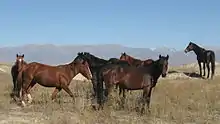Novokirghiz
The Novokirghiz horse is a breed of horse developed in the 1930s in Kirghizia (Kyrgyzstan). It was developed by breeding the Old Kirghiz with Thoroughbred, Russian Don, and Anglo-Don horses. It is also known by the name Novokirgizskaya (Russian).
 | |
| Other names | Novokirgizskaya |
|---|---|
| Country of origin | Kirghizia, Russia |
Characteristics
The Novokirghiz is faster and more refined than the Old Kirghiz as a result of breeding with the Thoroughbred. Novokirghiz horses have small, neat heads; muscular necks; sloping shoulder; pronounced withers; long backs; sloping hindquarters; and the legs are usually straight, hard, short, strong, and muscular, without any feathering. Sickle hocks may frequently be seen. These horses closely resemble Don horses. They have been known to be able to cope with almost any kind of terrain. They have good stamina, endurance, and an energetic temperament.
These horses are usually bay, brown (a type of bay), gray, or chestnut, though they can be almost any solid color. Their height ranges from 14.2 to 15.2 hands high.
History
In 1918, forty-eight Thoroughbreds were imported to the Issyk-Kul stud in Kirghizia (Kirghistan) and were bred with Old Kirghiz mares. This breed became fixed during the 1930s and 1940s. Since then, it has largely replaced the Old Kirghiz breed, which had descended mainly from Mongolian stock in the high mountains of Kirghizia and Kazakhstan. Because of breeding with the English Thoroughbred, the Novokirghiz has become faster and more refined than the Old Kirghiz. Other breeds that were infused into the Old Kirghiz to develop the Novokirghiz are: English Thoroughbred, (Russian) Don, and half-bred Anglo/Don blood.
Uses
The Novokirghiz is useful for harness, riding, and agricultural work, as well as pack horses in the mountains. It is able to cope with almost any type of terrain. The mares are usually used for milk, which locals ferment and turn into kumis, a major staple of their diet. These mares can give up to 20 kg of milk daily. Speed records of this breed are: 1600 m in 1 min 48 sec, and 2400 m in 2 min 44.2 sec. Presently, there are 56,650 in this breed, with 10,700 being purebreds.